About our research
About our research
Chemical industries provide essential goods to society which both help and enrich our daily life. But a chemical substance or process can result in a catastrophe by explosion and fire when their proper handling derails and the reaction goes out of control. The theme of our laboratory is to develop methodology and establish measurements on how to avoid runaway reactions, reduce the risks accompanied with such chemical reactions, and even utilise unstable chemical substances with their unique properties. In order to achieve safety in chemical industry, our field of study ranges from material and chemical process safety, to developing safety management strategies to effective safety education.
Chemical Process Safety
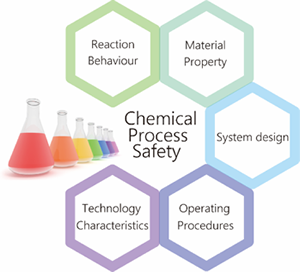
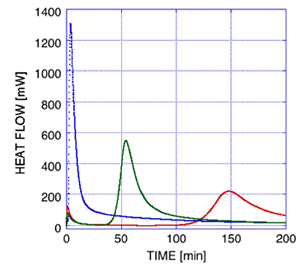
Chemical processes convert raw substances into useful material by means of chemical reactions. Each chemical reaction has its own feature and many chemical reactions exhibit risks of explosion. For example, some chemical processes involve runaway reactions in which the reaction rate is accelerated by heat generation and typically ends with a fatal accident. These risks can change depending on the reaction conditions such as temperature, material of apparatus, and even the order of addition of raw substances. A safe chemical process is required for a good understanding of the reactivity of the substances, process behaviour, and latent hazards of the process.
Our laboratory studies how to seek hazards in a chemical process and analyse the reaction mechanism of runaway reactions which contributes to loss prevention.
Subtheme / Keywords
・Hazard analysis at each step in the life cycle of chemical substances
・Preventive method development of runaway reaction by analysis of reaction mechanism
・Calculation method development of accident occurrence in chemical processes
Ongoing research projects
・Mechanism analysis of a reaction exhibiting an induction period
・Development of a new time constant correction method for more
accurate measurement by the reaction calorimeter
・Hazard identification of novel reaction processes
Energetic Materials chemistry
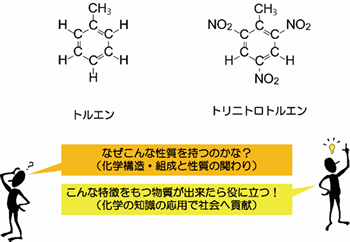
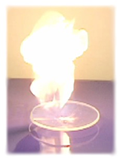
"Energetic materials" are substances which easily decompose by external stimulation such as heat, friction, impact. The materials can be regarded as storages of energy, and the unique properties releasing decomposition gases, light and energy in an instant has been utilised in various places in our society. Meanwhile, the mishandling of the material can cause severe accident by injure people and damage properties and good understanding of properties is cardinal.
Meanwhile, the mishandling of such materials can cause severe accidents and injure people and damage properties. Therefore, a good understanding of their properties is essential. A thorough knowledge is also important for designing new materials with desired properties, such as a green pyrolant.
Our group studies the influence of chemical structure and electronic condition on the energy release behaviour with the aim of contributing to the design of novel energetic materials and safe handling of energetic materials.
Subtheme / Keywords
・Design and synthesis of novel energetic materials
・Development of hazard evaluation methods for energetic materials
・Application and performance enhancement of energetic materials
Ongoing research projects
・Influences of charcoal properties on the burning rate of black powder
・Design and synthesis of novel airbag gas generator
・Preparation of cocrystals from azole compound
・Mechanism analysis of degradation process for energetic materials
・Development of anti-degradation technique for pyrotechnics compositions
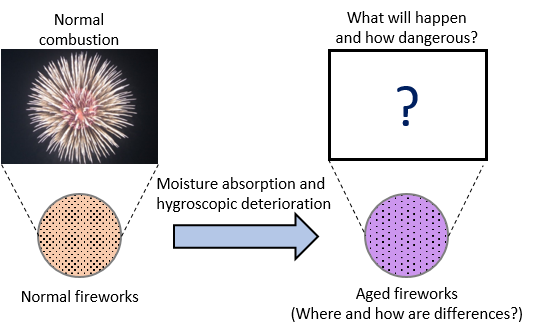
Safety management
Similar to chemical processes, a complex system consisting of lots of elements has different types of risks which need to be managed. For managing such risks, our laboratory focuses on the unfolding of the structure of the complex system. Industrial hazards may trigger natural hazards and studying 'Natural and Technical Hazard' (or Natech) risks is one of the topics in this area
Another topic involves the development of an educational tool for chemical processes: a collaborative work with researchers in private sector, public sector, and academics produced a tool for education and a comparative study was conducted with academics outside of Japan.
Cascading natural hazards, Kumasaki et al. (DOI 10.1007/s11069-015-2028-8)
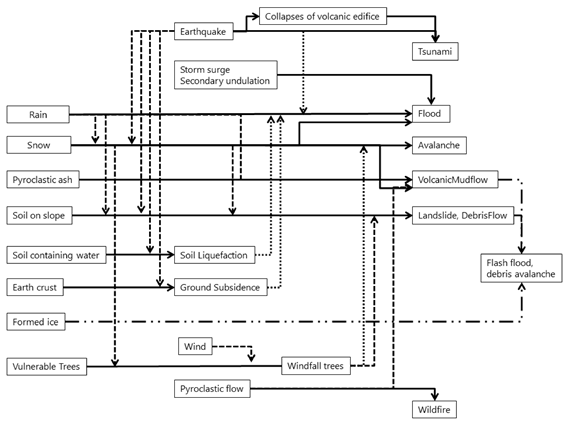
Subtheme / Keywords
・Natech risk management
・Development of mitigation methodology
・Chemical Safety education
Ongoing research projects
・Analysis of workers' behavior and perception to health and safety measures
・Categorisation of mitigation measaures and its application for Natech
Relevant projects
In "Qualitative analysis of Workers' attitudes toward safety activities" (funded by the Health and Labour Sciences Research Grant), workers' thoughts collected mainly by interviews have been analysed to establish a model of what they think, how they process, and respond toward the safety activities conducted by their organisation.